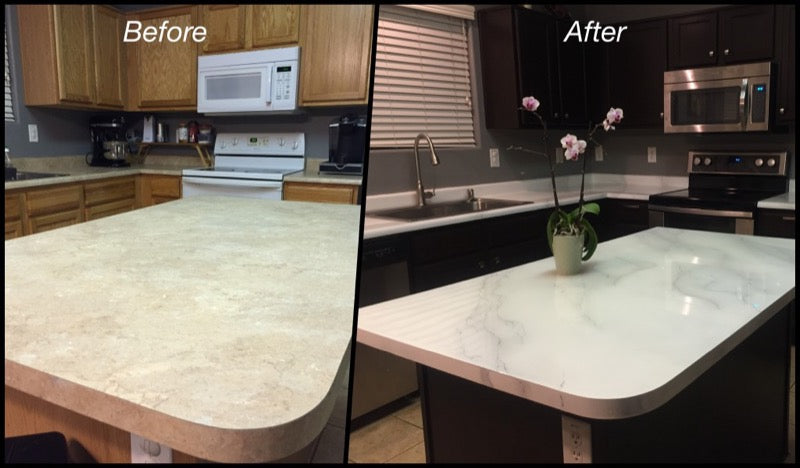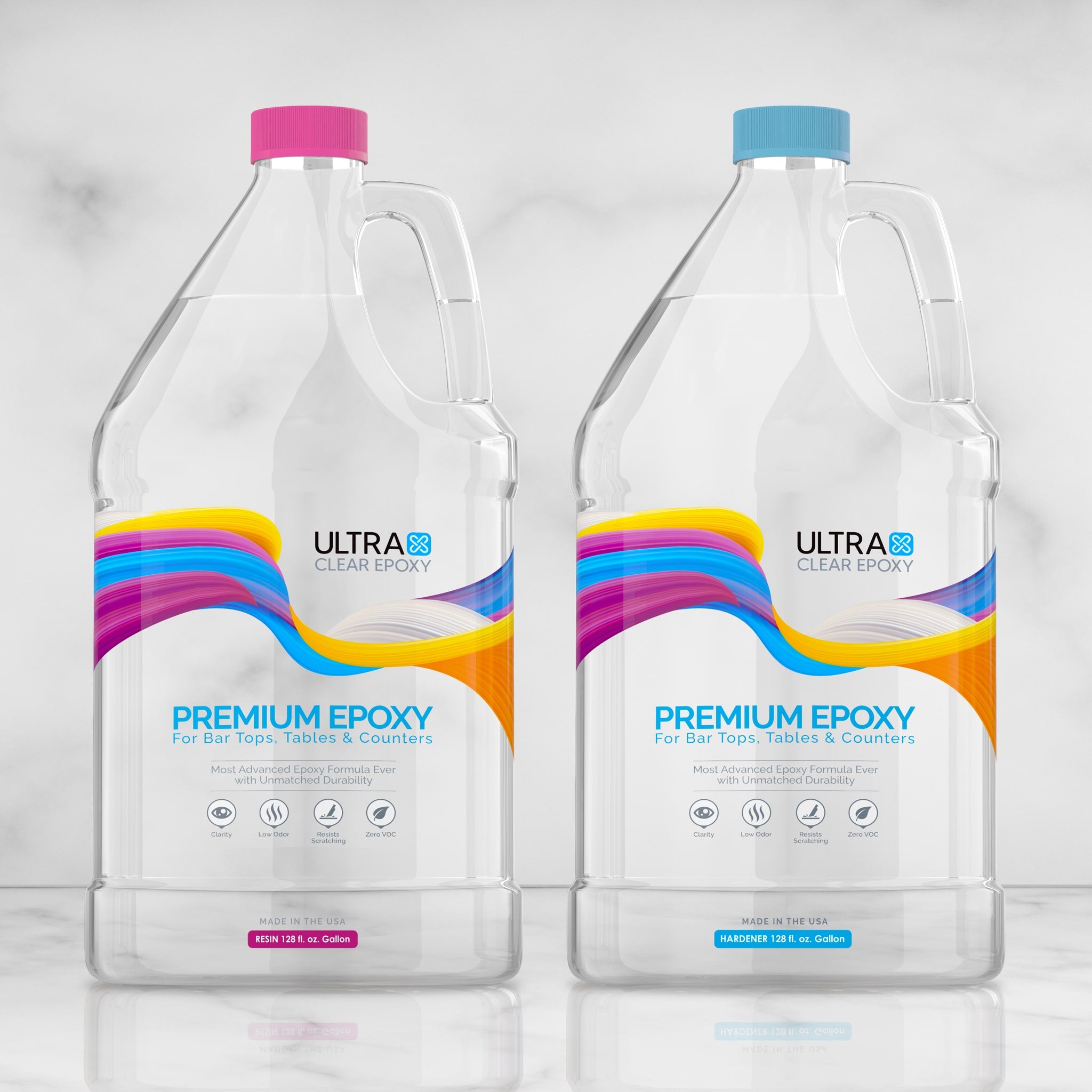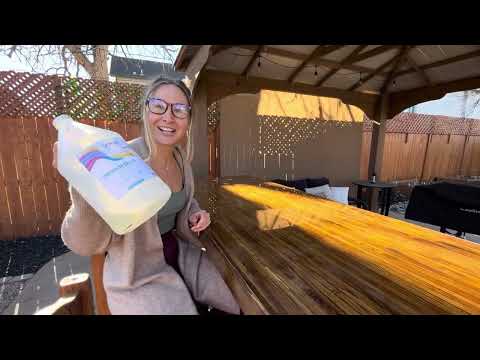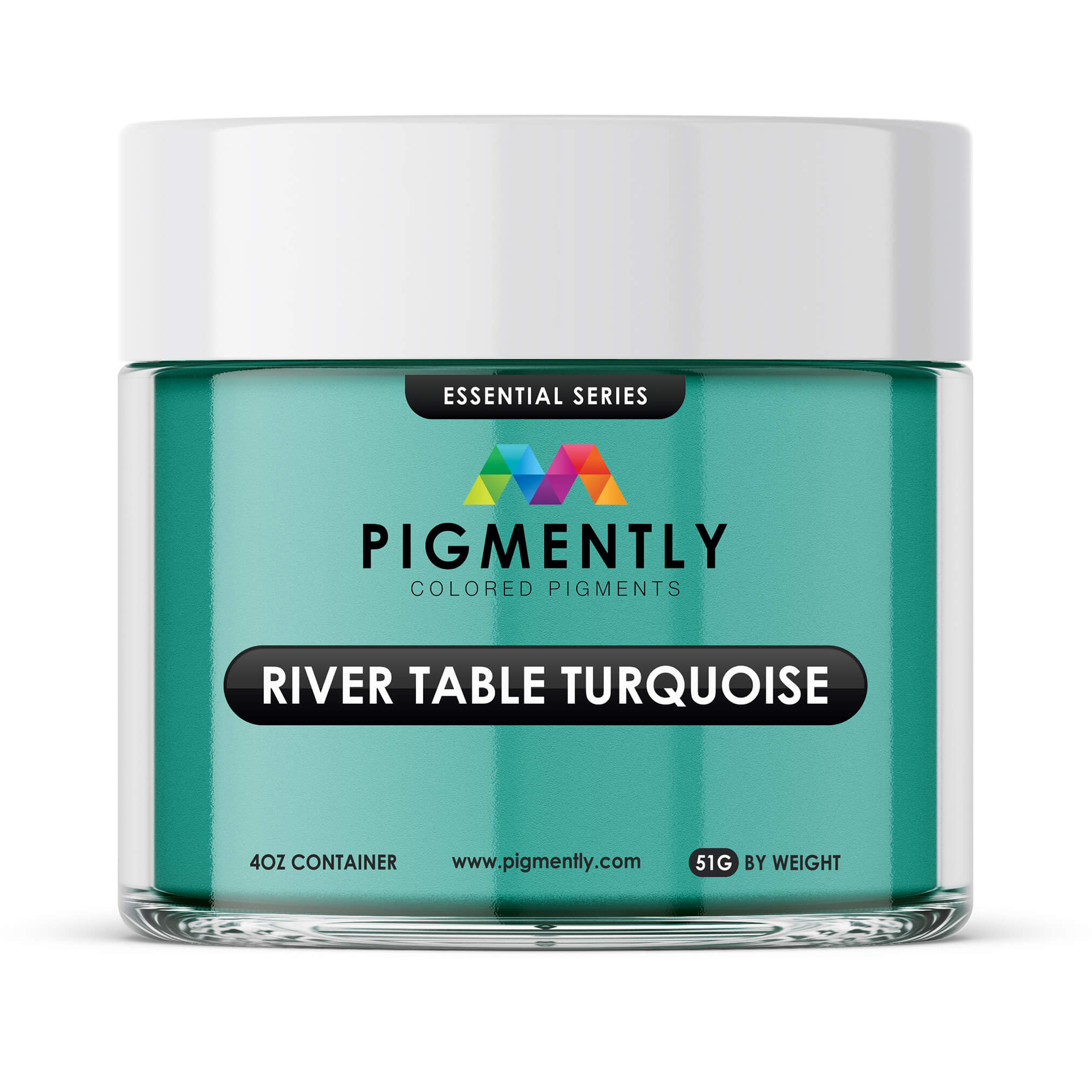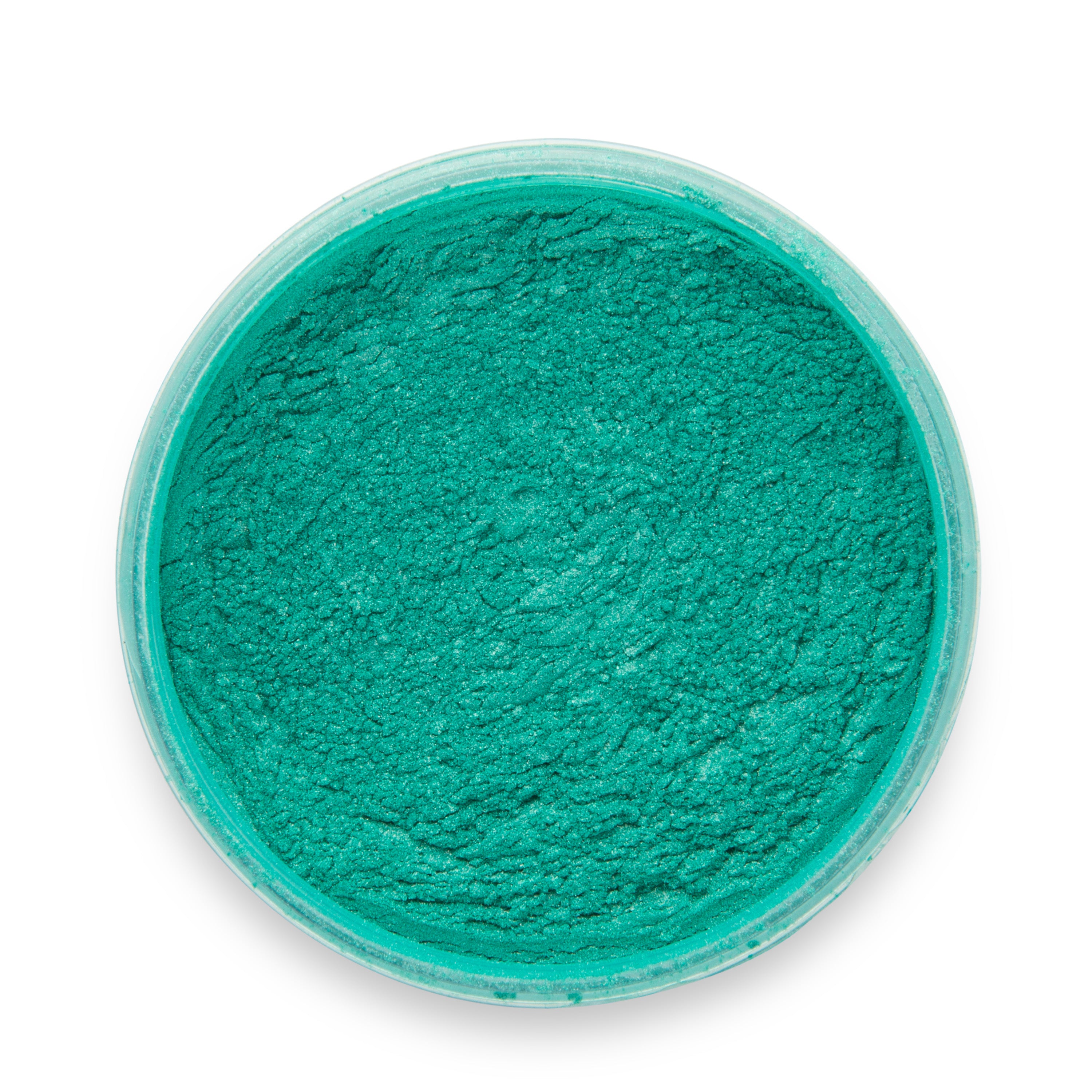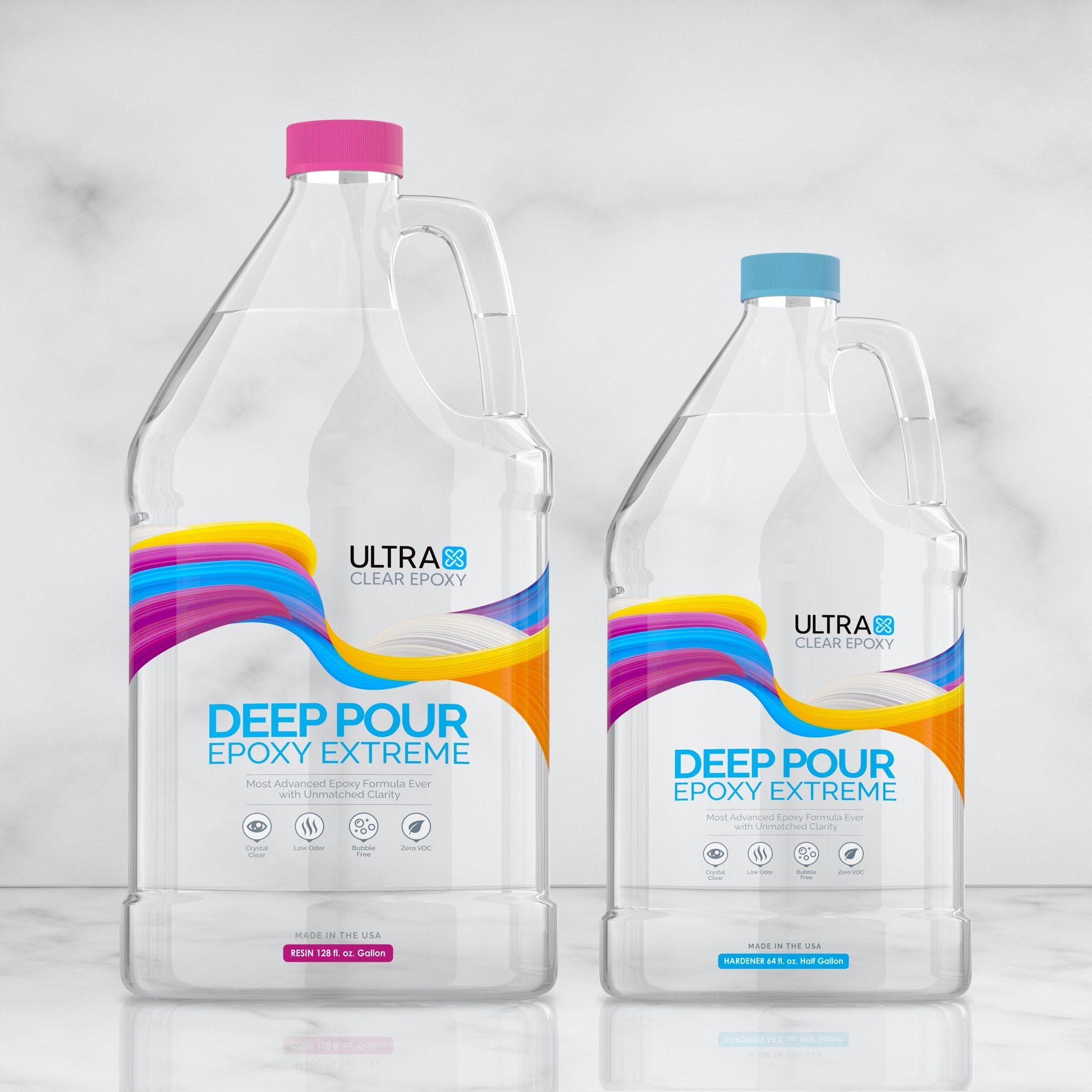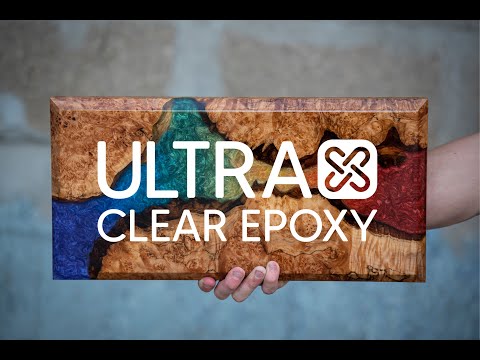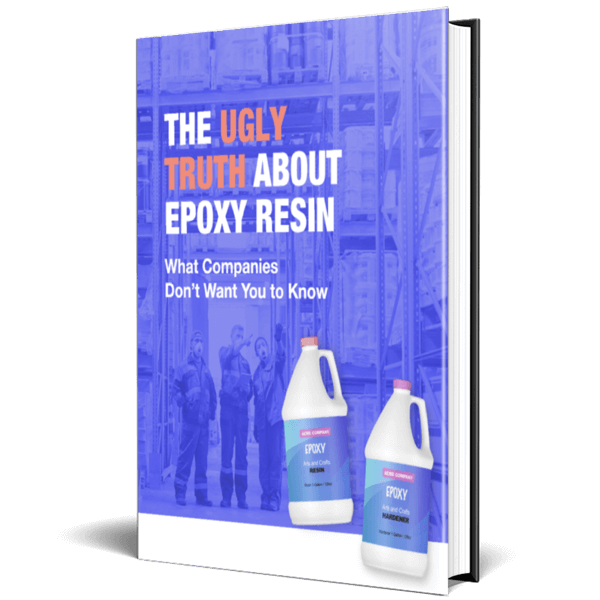If you're planning a countertop renovation—whether to restore something older or create something new—it's always a good idea to consider each of your options before you make your decision.
In this guide, we'll introduce epoxy countertops, describe what they are, and discuss what you should be aware of when purchasing epoxy and any supplies needed for your project.
What is epoxy?
Epoxy, sometimes called "liquid glass", is a transparent plastic with a very high hardness rating. It's often used to cover materials like wood, marble, and granite that have pleasing or attractive appearances but are vulnerable to wear and tear from constant use or environmental conditions such as moisture and wide temperature shifts.
In it's liquid state, epoxy is classified as a mild skin irritant. Not everyone will react to it, and you can avoid that concern entirely by wearing gloves and being careful as you work with it. If it does get on your skin, it's also easy to wash away.
Cured epoxy is safe, and has been classified as non-hazardous, containing no volatile organic compounds.
For making an epoxy countertop, a two-part table top epoxy is typically used. Two-part epoxies are epoxies that are stored as two separate components, referred to as resin and hardener.
Once the project begins, these liquids are mixed together and then poured onto the surface they'll be protecting; this surface is called the substrate. As it's poured, the epoxy self-levels, spreading out across the surface until it reaches equilibrium, resulting in a smooth, even coat that will begin to cure.
Once cured and cleaned, the epoxy will have a crystal clear finish, showcasing the protected material just beneath it. It will be incredibly resilient, able to withstand tremendous impact and pressure, with high-scratch resistance.
Epoxy can also be made colorful, using a variety of pigments and dyes that can be added during the mixing phase.

What is an epoxy countertop?
An epoxy countertop is any countertop with a layer of cured epoxy covering the surface to protect it from wear and tear. There are a lot of advantages to choosing an epoxy countertop for your home or place of business:
- Inherent toughness
- Budget-friendly
- Low maintenance
- Very customizable
We'll discuss each feature in detail below.
Epoxy countertops have inherent toughness
When epoxy is applied to a typical substrate, such as wood, it bonds so tightly and densely that it becomes almost impervious to impact. Because of this, epoxy countertops are frequently constructed for hectic environments like commercial bars, restaurants, etc., as well as for more domestic locations like homes, neighborhood clubhouses, and community centers.
Our own brand of epoxy was tested for hardness using the Shore hardness scale; it scored an incredible 98 out of 100 Shore type-D rating.
Additionally, cured epoxy is waterproof, so you don't have to worry about moisture damage.
Epoxy countertops are budget friendly
Whether you're working with minimal funds or a generous budget, epoxy countertops are a cost-effective way to get a unique top-quality countertop.
You can apply epoxy to almost any countertop material, including common choices like wood, laminate, marble, quartz, and granite. Because epoxy is transparent when it has cured, it won't obscure the beautiful aesthetics of these materials.
Epoxy can also emulate more expensive materials that may be out of your budget-range or in limited supply. For instance, by using color pigments in your epoxy, you can replicate the appearance of a granite or marble countertop, while still receiving all the benefits of epoxy's strength and smooth surface.
Learn to identify quality resin from subpar knockoffs.
Good-quality epoxy resin will last many years and doesn't have to be expensive.
However, many low-cost resins are poor quality and can break down or fail much sooner than they should. Understanding the difference between affordable resin and low-quality resin will help you spend wisely without compromising on quality.
Our free ebook, The Ugly Truth About Epoxy Resin: What Companies Don't Want You to Know, explains what to look for in an epoxy resin, and what to be wary of.
An epoxy countertop will be low maintenance
Because epoxy is an inert plastic with naturally high durability, epoxy countertops tend to last a very long time, with less upkeep than most other surfaces—a real time-saver.
An epoxy countertop is also easy to clean using common household cleaners—or just soap and water—due to its smooth surface which won't retain residues, particles, or odors.
Epoxy itself is very customizable
When epoxy is in its liquid state, it is receptive to certain kinds of pigments, which allow you to change the resulting color to any degree you desire. The more pigment you add, the deeper and darker the color it will retain as it cures and hardens.
Using this method, it's possible to be truly creative by mixing up smaller batches of epoxy with different colors or color density, then pouring them in certain ways to form one-of-a-kind patterns or imagery.
It's also possible to texture the surface of the epoxy while it is curing to give it a different tactile feel, if desired, though this is a more advanced technique and is better handled by someone experienced.
In our store, we offer a selection of premium epoxy pigments and resin dyes by Pigmently, a brand we've found both reliable and consistent.
You can view numerous examples of this versatility in our customer review photo gallery.

What to watch for when planning an epoxy countertop
With the right planning, constructing your own epoxy countertop is a straightforward process. Our UltraClear Table Top Epoxy comes with an in-depth set of instructions, which can also be found on our support website.
However, there are a few factors to be aware of when shopping for any materials and supplies you need:
Not all epoxy brands are high quality or accredited.
There are many epoxy brands these days. Some brands may cost less, but generally it's because they sell a low-quality product with substandard components which can result in a murky or weaker finish.
You should also be wary of purchasing any epoxy that hasn't been tested for durability and safety.
Ideally, you'll want to purchase epoxy from a credible source that you can trust to deliver exactly what you intended. Epoxy countertops are a one-time project; with careful planning you can avoid future problems.
For an epoxy countertop, we recommend our premium UltraClear Table Top Epoxy. This is our strongest epoxy finish, ideal for a high-traffic item like a countertop.
There are multiple types of epoxy
Epoxy labeling can be a bit nebulous at times, but there are several common types of epoxy. The type we use and recommend for countertops is usually called table top epoxy. This is the strongest epoxy meant for furniture and work surfaces.
Another type that can be used in tandem with table top epoxy is deep pour epoxy. Deep pour epoxy is for projects that will need very thick layers of epoxy, usually to embed objects, e.g., coins, bottle caps, shells, and such. This is then is usually covered with a final topcoat of the table top epoxy for its higher durability rating.
Some epoxy products may use toxic chemicals
As mentioned above, some epoxy brands use different quality ingredients in their blend. It's not always obvious which ones do this, but fortunately you can request a safety data sheet (SDS) for any product from its manufacturer. If they refuse to provide one or if it doesn't look legitimate, we strongly recommend against buying from them. All credible epoxy brands selling in the U.S. will have proper safety data sheets for each epoxy product.
Want to see ours? Click here to see our epoxy safety data sheets.
If you're unsure about doing it yourself, consider a contractor
Although epoxy is relatively easy to work with, sometimes the reassurance that comes with hiring a professional group to install your epoxy countertop is worth the cost.
Epoxy isn't particularly niche or complicated, so most contractors who work with bars, tables, or countertops will have experience with it. Depending on your area, you may have fewer options, so we recommend doing a little research and trying to find a reputable contractor who will charge a reasonable price.
We also keep a list of contractors who've personally worked with our product in the past. You can find it by clicking here.
Make sure you have all of the tools and supplies you'll need before you start.
The actual epoxy phases of these projects don't take a lot of time, often a day or two at the most, but they are time sensitive. Once you start mixing the epoxy resin components together, the curing process begins.
You need to be prepared for each step and have the necessary equipment at hand. If you've done so, you'll even have some leeway to handle minor mistakes like accidental spills.
We offer pre-made epoxy tool kits that can save you the trouble of gathering each item individually. If you already have some of what you need, each item is sold individually on our store as well, and you can buy similar versions of these goods at local home improvement stores.
Our conclusion
The process of making an epoxy countertop isn’t as daunting as it seems. Just choose your base material for the substrate, determine which epoxy you need, and gather the tools and supplies required. Then follow the directions included with the epoxy you've purchased.
Each epoxy order we ship is packed with a detailed set of instructions covering each phase of the process as well as what tools you'll need and how to prepare your project environment so that everything goes smoothly on the day you build your countertop. For example, you can find the instructions for our brand of table top epoxy by clicking here.
We also have a video tutorials section that will show you the actual process of each phase.
Additional Resources
Here are some additional resources you may find helpful for planning your project.
- How to measure the amount of epoxy you need - Our guide to determining how much epoxy you need for a project.
- Epoxy for beginners: Basic project tools and supplies - A rundown of the tools and supplies you'll need for a typical epoxy project.
Have questions? Want advice? Contact us!
If you'd like to learn more about the specific epoxy products we sell, you can read about them on their products pages: UltraClear Table Top Epoxy and UltraClear Deep Pour Epoxy.
And finally, if you have any additional questions or would like help figuring out what you'll need, feel free to contact us via phone or email here. During business hours, you can also text chat online using the help button at the bottom right of your screen.

